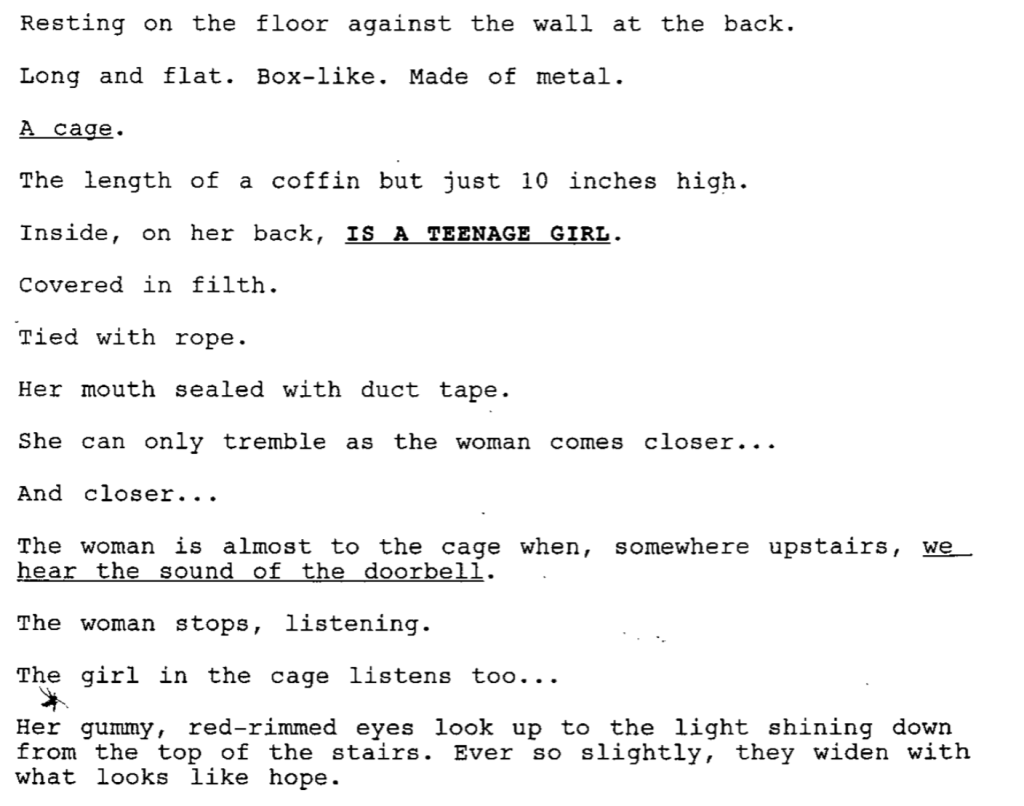Genre: Drama/Horror?
Premise: A man who’s lived his entire adult life in a mental institution obsessing over the beautiful niece he’s never met, finally decides to leave and find her.
About: Ted Foulke, aka Wentworth Miller, became a tour de force on the screenwriting circuit back in 2010, selling two scripts, Stoker and The Disappointments Room, back to back, winning over Hollywood with his sophisticated, intelligent, dark voice. Stoker became a huge project, attracting visionary South Korean director Chan-wook Park (Oldboy, Lady Vengeance, The Handmaiden). But something fell through the cracks during the adaptation, and the movie performed badly at the box office, disappearing out of the public eye almost immediately. The Disappointments Room, the more commercial of the two projects, didn’t fare much better, getting caught in the Relativity meltdown, ultimately dumped into the VOD market without any promotion. Today’s script, “Uncle Charlie,” is a prequel to Stoker.
Writer: Ted Foulke (Wentworth Miller)
Details: 119 pages
There was a good one year period there where Wentworth Miller was considered the best up-and-coming screenwriter in Hollywood. He wrote two specs, Stoker and The Disappointments Room, that wowed the shit out of anybody who read them. There was a depth and attention to detail that was absent from all the vapid empty scritps selling at the time, and just an interesting dark voice at the center of it all, giving us stories we’d never quite seen before.
But then the movies came out and they were… ignored. And I have a theory on that. Films that fall under the horror tag but don’t contain supernatural elements struggle to find an audience. There are exceptions to this. If the scripts have a big flashy hook (Get Out or The Purge), they can work. But if you have something like Stoker, where it isn’t 100% clear when you watch the trailer what genre we’re in or what kind of story we’re watching, that’s going to keep people out of the theater.
And the problem with Miller is that he actually makes his scripts intelligent. Which, funnily enough, alienates audiences even more. If he could just dumb it down a little (throw a killer clown in there), I’m sure he’d be one of the biggest horror screenwriters in town. I’d love to see a Miller supernatural horror film. I think it would be awesome. But for right now, we have his prequel to Stoker, Uncle Charlie. Let’s check it out.
“Uncle Charlie” starts out explaining that this a prequel to Stoker, and therefore if you don’t know that film, you won’t be able to appreciate this one. That’s a tricky choice because I don’t remember much about Stoker. But I do remember that a teenage girl named India loses her father and she and her mother move in with his mysterious brother, Uncle Charlie.
What we come to know later in the film is that Uncle Charlie has spent nearly his entire life in a mental institution. And that’s where we find Charlie here, a year before the events of Stoker, pulling off his best One Flew Over the Cuckoo’s Nest impression, wrecking havoc on his version of Miss. Ratchet, Doctor Walker. Charlie could’ve left this place years ago. He was actually able to leave the day he turned 18. But he CHOOSES to stay here.
When Charlie’s not making Doctor Walker’s life miserable, he’s drawing pictures of India. This part I didn’t understand. As far as I can tell, he’s never met India. So I don’t know how he can draw her so well. Maybe he’s seen pictures of her?
Meanwhile, back at the farm, India divides her time between going to school and taking piano lessons with her new teacher, Miss Price. Miss Price is an excellent teacher minus the fact that she moves from town to town, torturing and killing her students. In fact, she’s got one locked up in a cage in her basement right now. One that will have to be “taken care of” in order to make room for an unsuspecting India.
Over at the nut house, Uncle Charlie finally decides to flee the coup, illustriously turning Dr. Walker into a vegetable before doing so. And the first place he goes is India’s town. He’s got to meet his obsession, of course. He gets there right when India goes to her first high school dance. And let’s just say he “takes care” of India’s date so that she’s free.
That night, after the dance, India runs into Miss Price, who “happens” to be driving by, and who offers India a ride home. But, oh yes, she wants to stop by her house first to “show India something.” We all know where this is going. However, what Miss Price doesn’t know is that India’s got a new guardian angel. A very dangerous new guardian angel.
If yesterday’s prose annoyed you and you prefer a more classic writing style, this script is for you. Miller’s prose is simple, efficient, descriptive, and flows better than any script you’ll read this year. It’s what makes his scripts so easy to read, which, in this case, was necessary, since the story itself doesn’t stack up to his previous entries.
The problem is that Miller handcuffs himself with the prequel treatment. Prequels never work. Ever. I’m not sure why writers like them. They’re one giant narrative fork in the road where every path you take leads to a dead end. George Lucas painfully found this out when he started writing Episode 1. Wait, I have to keep two of my biggest characters, Obi-Wan Kenobi and R2-D2, apart for 99% of the trilogy?
Uncle Charlie follows two separate storylines, Uncle Charlie’s and India’s, and while these storylines want to find each other, or, at the very least, intersect, they can’t. Because in the next movie, Uncle Charlie and India meet for the first time. Miller tries. He tries his darndest, even cheats to give us that crossover moment. But the storylines never overlap in any meaningful way, which leaves the reader wondering, what was the point?
Another issue is that the script’s best plot thread, the serial killer piano teacher, is operating at a net negative. We know Miss Price can’t kill India because India appears in the next movie. And if you don’t have the uncertainty of whether India will succumb to this monster or not, where is the suspense? These movies only work if they’re suspenseful. So if your splashiest storyline can’t mine that tool, what’s the point?
You also run into issues like, what are the chances that so many killers are randomly intersecting in life? What are the chances that this girl has a serial killer uncle AND a serial killer piano teacher? Audiences start asking themselves these questions. And the answers are what break the suspension of disbelief.
“Uncle Charlie” also reminded me of a problem I had with Stoker. India isn’t an interesting character. I’ve told you guys this before. Be careful about making your main character a sociopath, eliminating all feeling and personality from them. These people walk around emotionless for 100 minutes, leaving the story feeling empty and cold whenever we’re around them. Miller tries to balance this out with the wackier more expressive Uncle Charlie, and it works to an extent. Uncle Charlie is a compelling character to watch. But like I said, the narrative is so handcuffed by its inability to intersect, it ultimately doesn’t matter.
“Uncle Charlie” is a fun and easy read for those who like reading scripts. But there’s neither a hook or a plot here that necessitates it becoming a movie. If Miller were to ever pursue this, it’d be in his best interest to eliminate the India side of the story and watch Uncle Charlie go off on some adventure. There are plenty of fun threads you could find there.
Old School Scriptshadow Script link: Uncle Charlie
[ ] What the hell did I just read?
[x] wasn’t for me
[ ] worth the read
[ ] impressive
[ ] genius
What I learned: Prose is simplicity. Miller is known for having some of the best prose in the business. But note how his description usually stays between 1-3 lines long. Note how he doesn’t use SAT words. Note how a lot of his prose breaks down to short fifth-grade level sentence structure. “Uncle Charlie” is right up there for you to download and see for yourself. A lot of beginner writers would do well to study it.




